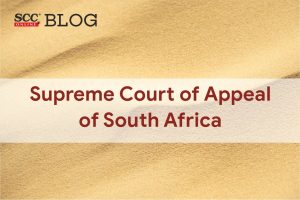Supreme Court of Appeal of South Africa | While deciding an appeal filed with view to challenge the order of Free State Division of the High Court, Bloemfontein, challenging the way in which the evidence was collected by the authorities and the role played by those evidence collected in prosecution of the appellants, the bench comprising of VM Ponnan*, CHG Van Der Merwe, Z Carelse, JJA. (Judge of Appeal), MV Phatshoane*, and Makaula, AJJA. (Acting Judge of Appeal), held that the overall picture framed from the evidence collected was “pretty damning“.
FACTUAL MATRIX:
The accused kidnapped Zia Khan and threatened to kill him unless paid R2 Million by his relative Rashid Anwari Khan. The accused went on to rob Zia Khan and buried him after killing him in a shallow grave. It was also alleged by the state that the accused persons conspired to kidnap Rashid Khan also. Each of the accused persons were convicted and sentenced for imprisonment for life.
APPELLANT’s CONTENTION:
The appellants contended that the search of the premises and seizure of exhibits violated the appellants’ right to privacy and the evidence were collected unlawfully and the actions of the authorities had no sanction of law. The appellants requested a trial within a trial for the determination of veracity of the evidence so collected by the authorities. The appellants also raised an objection regarding the evidence relied upon by the prosecution as they were hearsay in nature and inadmissible under Law of Evidence Amendment Act 45 of 1988 (the Law of Evidence Act) and thereby sought their exclusion from the trial.
The appellants also raised objections regarding the witnesses relied upon by the prosecution while questioning their reliability and credibility.
OPINION AND ANALYSIS:
The Court relied upon Moshephi v. R, 1980-1984 LAC 57 at 59F-H where it was stated that meticulous examination of all the evidence is necessary, but the Court has to look at the bigger picture while giving a judgment because, “If that is not done, one may fail to see the wood for the trees”.
The Court while pointing at the Constitution’s specific exclusionary provision (S. 35(5)) stated that there is no provision for automatic exclusion of an evidence obtained unconstitutionally and held the trial within trial held by the trial court to be wrong and held that “unfairness in the method of obtaining the evidence does not necessarily result in unfairness in the trial”. It was pressed that the trial court should have attempted at identifying the evidence before prying at the question of their admissibility.
The Court emphasised on the exclusion of the hearsay evidence to be necessary for a fair trial and stated that the extra-curial statements given by the witness should be connected to the facts of the case. The Court pressed at the adoption of holistic viewpoint while satisfying the reliability of hearsay evidence. The testimony of witnesses relied upon by the prosecution were excluded to some extent but such exclusion was not enough for material distraction from the hypothesis of the prosecution. While discussing the credibility of a hearsay evidence, the Court placed its reliance upon Seemela v. S, [2015] ZASCA 41; 2016 (2) SACR 125 (SCA) in which it was stated that, “For many years our law knew a rigid exclusionary rule which allowed specific exceptions but no relaxation. Now there is no exclusion as such. Hearsay evidence may now be accepted subject to the broad, almost limitless criteria set out in s 3(1).” The Court refused to reject the evidence as hearsay as other evidence were supporting the statements given by two of the witnesses.
The Court expunged the question regarding reliability of the witnesses stating that the admissibility of the evidence given by the witnesses cannot be questioned because the cross-examination accorded with the hypothesis advanced by the prosecution.
The Court placed its reliance on R v. De Villiers, 1944 AD 493 at 508 wherein it was said that“It is of the utmost importance to bear in mind that, where a number of independent circumstances point to the same conclusion the probability of the justness of that conclusion is not the sum of the simple probabilities of those circumstances but is the compound result of them.”
The Court further refused to deal with the role of the accused persons individually as there was active participation and common purpose liability.
The Court in the conclusion while dismissing the appeal held that the evidence, even if viewed individually, does not tip the balance in favour of the accused.
[Saleem Qurashi v. State, 2022 SCC OnLine ZASCA 1, decided on 22-08-2022]
Advocates who appeared in this case:
J Nel SC and J Potgieter, Counsel for the Appellants;
A Simpson, Counsel for the Respondent.
*Ritu Singh, Editorial Assistant has put this report together.

